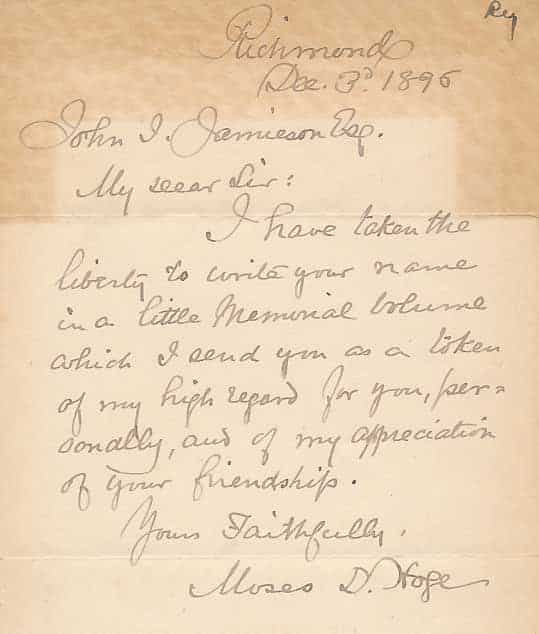This Day in Presbyterian History:
An American Spurgeon
 Born into a family of ministers in 1818, Moses Drury Hoge was reared in the doctrines of the Christian faith. Twenty years later, Moses made a profession of faith. Entering Hampden-Sydney College in Virginia, he graduated as valedictorian of the class. His theological studies took place at Union Theological Seminary in Richmond where he was to study under the finest theologians of the South. Licensed into the Presbyterian ministry, he began to preach the Word to a large congregation at the Second Presbyterian Church of Richmond, Virginia. His time there as pastor would stretch for nearly fifty years.
Born into a family of ministers in 1818, Moses Drury Hoge was reared in the doctrines of the Christian faith. Twenty years later, Moses made a profession of faith. Entering Hampden-Sydney College in Virginia, he graduated as valedictorian of the class. His theological studies took place at Union Theological Seminary in Richmond where he was to study under the finest theologians of the South. Licensed into the Presbyterian ministry, he began to preach the Word to a large congregation at the Second Presbyterian Church of Richmond, Virginia. His time there as pastor would stretch for nearly fifty years.
When the War between the States broke out in 1861, at first he was not in favor of secession. He had offered freedom to all of his slaves which had accompanied his wife’s estate, but only one was willing to accept the gift of liberty. But when Virginia left the Union, he went with her decision with his whole heart and soul. With thousands of Confederate soldiers gathering in Richmond, the capitol of this new nation, they were added to his congregation. It is estimated that as many as one hundred thousand soldiers of the Confederacy heard the gospel from his lips. Often he would travel to the actual battlefield, while the battle was ongoing, to minister to the spiritual needs of the men. Once he even sailed through the naval blockade to England to bring back Bibles to the men and women of the southern confederacy. When defeat came four years later, he was overcome with grief at the dark providence of God, but rallied his people with sermons from the Bible.
After the war, Moses Hoge traveled to every part of the nation, including trips to Europe, to deliver hundreds of biblical sermons with power. One wrote of him, “He preached with power, pathos, pleading, and spirituality. No notes either, but all free, direct, and natural. He is our Spurgeon.” Moses Drury Hoge would depart this earth on January 6, 1899.
[Below, a letter, now preserved at the PCA Historical Center, which
Dr. Hoge enclosed with a book sent to a close friend]

Words to Live By:
“We are to pray for . . . ministers.” (Larger Catechism, #183)
In fact, know their weekly schedule, by simply asking them for it. Any minister will be glad to give it to you. I know of one congregation whose pastor has given his week in general to specific members of the congregation, who then have his ministerial labors on which to pray for a special day of that week. In that way, the work of the Lord is brought before the Lord on an every day every hour span of time. What a great example for all of our congregations to follow.
Through the Scriptures: Genesis 16 – 19
Through the Standards: God is the Divine Author of Scripture
WCF 1:4
“The authority of the Holy Scripture, for which it ought to be believed, and obeyed, depends not upon the testimony of any man, or Church; but wholly unto God (who is truth itself) the author thereof; and therefore it is to be received, because it is the Word of God.”
Dr. Hoge’s first published work was Honorable Old Age: A Sermon preached at the funeral of Capt. Benjamin Sheppard (1855). His last published work, gathered under his own hand, was Cause and Cure of Despondency (1898). Posthumously, there was published a collection of his sermons under the title The Perfection of Beauty (1904). Ironically, in one of those sermons, Dr. Hoge himself paid tribute to Spurgeon :
“…I do not know of any history more instructive in another aspect than his. It shows how a man with the courage of his convictions, how a man who is intensely loyal to the truth, and fears nothing but what is wrong, will at last triumph over all opposition. Very few men have lived in England that were subjected to the ridicule and misrepresentation Mr. Spurgeon was during the early years of his ministry. Hundreds of stories were invented reflecting upon his manners, reflecting upon him in every way, and yet he pursued the even tenor of his way without even a murmur, with his bright, genial spirit unchilled by the abuse that was heaped upon him. He went on quietly, with the pluck and perseverance that characterized him, until the time came that he won over to himself all the parties in England, and not only all the parties, but all the different classes of society.”
[“Liddon, Bersier, Spurgeon,” The Perfection of Beauty, p. 149.][Our author, Rev. David Myers, didn’t know of Dr. Hoge’s tribute to Spurgeon when he wrote today’s devotional. Click here to read the entire portion of Dr. Hoge’s tribute to Charles Haddon Spurgeon.
Image sources:
1. Frontispiece portrait from Fifty Years a Pastor. An Account of the Observance of the Semi-Centennial Anniversary of the Installation of Rev. Moses Drury Hoge, D.D., LL.D. in the Pastorate of the Second Presbyterian Church, Richmond, Virginia. Richmond, VA: [The Church], 1895.
2. Letter from Dr. Moses D. Hoge to John J. Jamieson, Esq., dated 3 December 1895, found enclosed with the above mentioned volume. Scanned by the staff of the PCA Historical Center.
